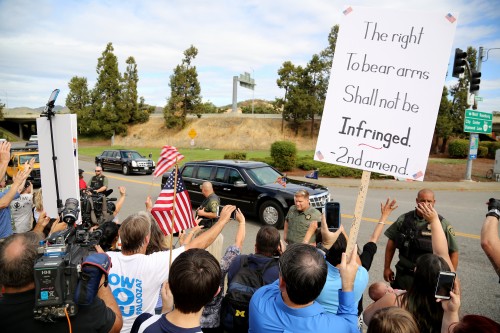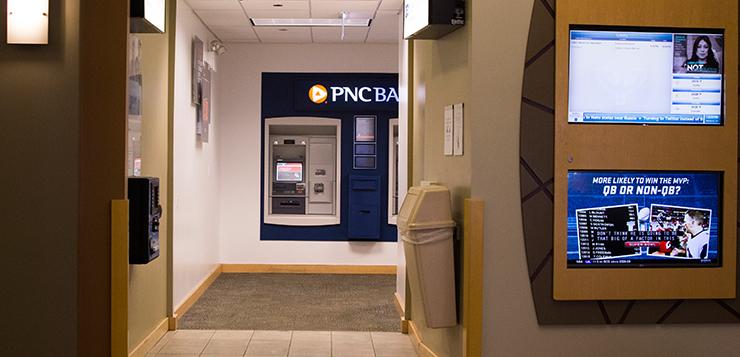
In the wake of recent school shootings across the country, many in the DePaul community wonder if the university is prepared to prevent and withstand a shooter with the intent to kill in cold blood.
The question is essential, especially after the death of 10 people at Umpqua Community College in Oregon on Oct. 1. At DePaul, people in the community have voiced a wide range of opinions on what to do, and Public Safety has procedures that predate recent events to maintain a safe environment for all.
“Panic is the worst thing you can do. The most important thing is for you to have a personal plan,” Robert Wachowski, director of Public Safety, said. “If you only know one exit, and the shooter is right there, you would panic.”
If a known shooter is on campus, policy says to exit the building, tell anyone of the danger and to call the Chicago Police Department.
Once the police respond to a call and arrive at the scene, “they take control,” Wachowski said. “Our officers assist in whatever they need.”
“We are not sworn, we are not armed, we don’t have arrest powers,” Wachowski said of Public Safety officers. “We can detain individuals and then turn them over to the Chicago police.”
Wachowski said that Public Safety had a prevention plan before the recent shootings.
“We’ve always take planning seriously, and we’re proactive about it. You go to conferences and training,” Wachowski said. “We rely on the police, the FBI. We do training with the Chicago police.”
The debate over guns has changed in the past years, especially in Illinois. In addition to law enforcement, law-abiding citizens are allowed to carry concealed handguns in public. The state was the last one in the U.S. to do so and only did so after a court order.
Yet the law does have its limitations. Someone with the proper licenses cannot bring a weapon within 1,000 feet of a school, according to the Illinois State Police. And the handler can only use the weapon in self-defense or when an offender threatens harm to the life of another.
These laws apply to DePaul, and as a private institution it can restrict these laws even further, Wachowski said.
However, Horace Hall, a DePaul professor of Education and Research, said that the issue of school shootings goes beyond gun laws.
“It’s not about the Second Amendment right, but it’s about the culture. How do we make connections between guns and our culture? We have to look at it in terms of poverty, race and mental health,” Hall said.
Hall said that there is legislation for people to carry guns in schools, such as in Texas where “campus carry” was passed in June, allowing people to carry handguns on campus grounds and buildings. But he added that “we have a lot of liberal-minded folks who think this is not the answer.”
“I don’t think it’s DePaul’s place to make that determination,” Hall said. “It’s for broader society to determine.”
Hall said that in the current discussion, there is a connection between mental health and school shootings. Many Americans have asked: why would a mentally sane person go out and commit such heinous acts?
This instance has occurred at multiple schools across the country, from Columbine High School in 1999, Virginia Tech in 2007, Sandy Hook Elementary School in 2012, and now recently at Umpqua Community College in Oregon, where a man shot and killed 10 people and wounded seven before he himself was killed in a firefight with the police.
“There needs to be a dialogue in the city and outreach to students who are troubled in that particular way,” Hall said.
Thus far, there is not widespread evidence suggesting that mental health is directly linked to violence. The National School Boards Association found in its 2012 study that “for every violent perpetrator of mass killings who has a history of mental health disorders and/or physical and social stressors, there are hundreds of individuals who have similar profiles who do not become violent.”
Students had opinions of their own regarding the prevention of school shootings.
Hasan Cetin, a DePaul sophomore who studies political science, said the answer lays in legislation.
“I think there should be more gun control laws,” Cetin said. “If there are more gun control laws, people wouldn’t have access to guns.”
At DePaul, Cetin said the security services were adequate. “I do believe our emergency things —blue towers — are enough. One can go there and call the services and the police to stop this violence.”
For freshman journalism major John Minster, mental health is a bigger concern. Coming from a family of hunters, Minister said it wasn’t right to increase gun control, “But if someone has a mental issue, something should be done.”
“People get so outraged, it gives the murderer attention,” Minister said. “We don’t want to give the attention these people are seeking,” in reference to shooters.
DePaul student Cody McGlasnan held a similar view, that as a community DePaul should open its ears to anyone.
“I think the general problem as a society, as a whole, is we’re not listening to people,” McGlasnan said. “We should spend more time reaching out to those who don’t reach out themselves. These people are in a lot of hurt.”
In terms of safety, students also held mixed views. Sophomore Elena Webstersaid that she feels that the dormitories are safe, but access for open buildings could be improved.
“I feel swipe access is a good thing to keep us safe. Anyone could come in. (It) makes me a little nervous,” Webster said.
Carla Castaneda, a freshman who studying accounting, also said that swipe access concerns her.
“I think for a lot of the buildings, anyone could come in and no one would know,” Castaneda said.
But for freshman Marcus Cooper,“the school does a good job in keeping a good eye out for people.”
In the end, Wachowski said people need to trust their gut.
“If you see something — usually instinct is good — but report it to someone. See something, say something. In the world we live in currently, that shouldn’t be taken as a joke.”




Lisa T • Oct 31, 2015 at 8:44 am
Interesting read. I wonder how prepared DePaul actually is. I think Prof. Horace Hall is correct in saying this issue is beyond just guns. I also wonder if/when we as a society will face those issues and STOP pointing fingers.